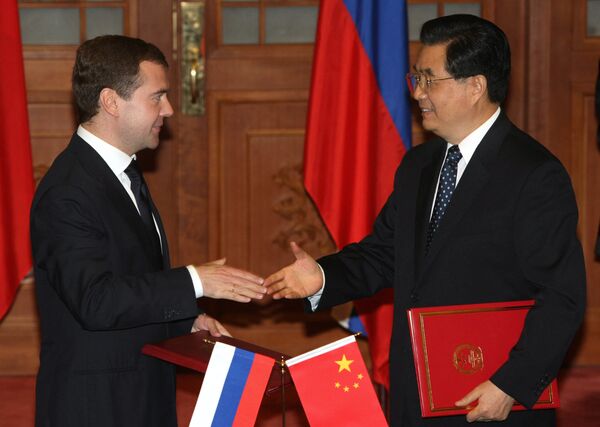MOSCOW. (RIA Novosti political commentator Andrei Fedyashin) – There is no denying that the Chinese are wonderfully decorous. President Hu Jintao, currently in Moscow on a state visit, was so tactful in reminding that the Chinese offshoot of the East Siberia – Pacific Ocean Coast oil pipeline should be completed on time that now there is no doubt that it will.
After holding extensive talks with Russian President Dmitry Medvedev on June 17, President Hu Jintao called the planned pipeline “ours” and said Beijing and Moscow should more actively negotiate cooperation in the sphere of gas production and nuclear energy and to elevate such mutually beneficial energy cooperation to new levels.
In one sentence, President Hu Jintao set forth the objectives of his visit in the run-up to the 60th anniversary of establishing Chinese-Soviet diplomatic relations. The Chinese leader wants to negotiate economic and energy projects and joint measures for coping with the global financial crisis.
Hu Jintao had an opportunity to discuss political aspects of bilateral relations at the latest Shanghai Cooperation Organization and BRIC (Brazil, Russia, India, China) summits in Yekaterinburg, on June 15-16.
He invited President Medvedev to visit China next year. Although the date of the visit has not yet been set, the Russian leader will probably go to China in December 2010 in order to attend the planned opening of the above-mentioned oil pipeline’s Chinese offshoot.
Beijing is looking forward to getting Russian oil and gas. The CEOs of Russian and Chinese gas companies also negotiated gas deliveries during Hu Jintao’s visit. On June 17, Gazprombank and the Export-Import Bank of China signed an agreement on financing the delivery of Chinese drilling, oil-pumping and gas equipment worth $300 million to Russia.
China, which is gradually starting to overcome the crisis, sorely needs the East Siberia – Pacific Ocean Coast pipeline, whose construction has been repeatedly delayed. The pipeline’s Chinese offshoot is expected to annually pump 15 million metric tons of oil.
Beijing’s decision to finance the construction project and to cover Gazprombank’s risks is a good answer to the project’s critics who claim that the entire politically motivated pipeline will never be filled to capacity. However, the far-sighted Chinese leaders will never finance construction of unprofitable pipelines.
Naturally, the global crisis has affected the scale of bilateral trade. In January-April, the Russian-Chinese trade turnover dwindled by 38.3% on the same period of 2008 and totaled $10.7 billion. The entire 2008 turnover was $55.9 billion.
The bilateral trade turnover does not match Russia’s vast size and the immense Chinese population. Last year, China was Russia’s third largest trade partner after Germany and the Netherlands.
Due to the crisis, rather than expanded trade relations, China surged ahead of both countries and became Russia’s No. 1 trade partner in January-March 2009.
In October 2009, Prime Minister Vladimir Putin will go to China and will prepare the visit of President Medvedev. The energetic Russian Prime Minister will also do his best to expand mutual trade and to facilitate Russian machinery and hi-tech exports to China.
Russia still posts a negative trade balance with China amounting to $13.5 billion.
Although Russian-Chinese foreign policy relations now resemble those between Moscow and Beijing in the first few years of Mao Zedong’s rule, they have become more pragmatic.
Importantly, during his Moscow visit, Hu Jintao did not once say that Beijing and Moscow were “allies,” resorting to the more cautious term “partners,” adding that cooperation between the two was strategic.
Despite this restrained and tactful diplomatic terminology, the West is baffled by the fact that Moscow and Beijing are moving closer together.
Commenting on Hu Jintao’s Russian visit, The Times of London remarked emotionally that Russia and China were “looking to the future without the West.” However, neither side concealed its striving to create a new multi-polar world.
Under a new multi-polar world concept, Moscow and Beijing want to act as the main magnets in their respective regions. Although this cannot be disputed, neither country can do without the West. Still it appears that neither Moscow, nor Beijing will cooperate with the West only to offset each other’s growing influence.
No matter what others may say and regardless of their reactions, China and Russia will continue to strengthen their role as major global players. However, their interests will inevitably clash in specific regions from time to time. But, most importantly, both huge nations should learn to live together in one boat. They should hold hands and coordinate all their movements because otherwise the boat will capsize.
The world found itself on the brink of nuclear conflict in the 1960s before the superpowers learned to live together in one boat.
Judging by Hu Jintao’s Moscow visit, both sides are successfully coordinating their efforts. Russian-Chinese partnership resembles relations between other former antagonists, namely, France and Germany in the European Union and Argentina and Brazil in Latin America.
Consequently, Beijing and Moscow have no alternative but to counterbalance each other. A search for real compromise and mutual self-discipline are the only way to maintain a delicate balance of interests.
Although both countries have failed to accomplish this objective in the past, they are successfully doing this today.
The opinions expressed in this article are the author’s and do not necessarily represent those of RIA Novosti.
Russian-Chinese relations hinge on delicate balance of interests

© Rodionov Vladimir
Subscribe
